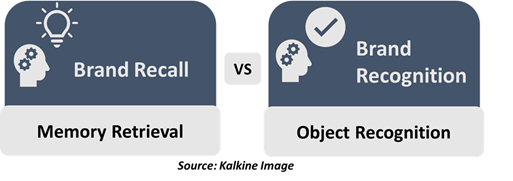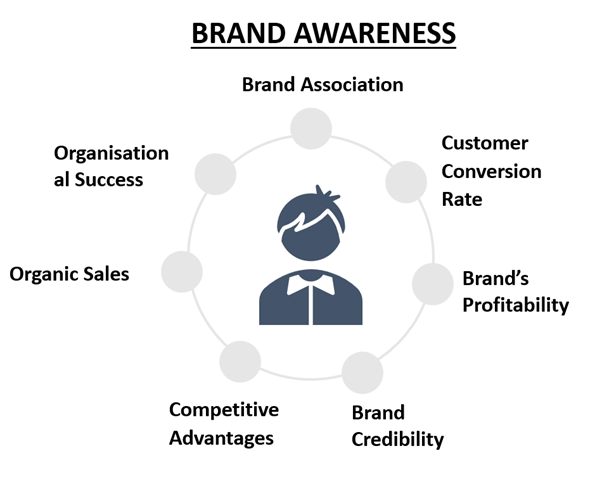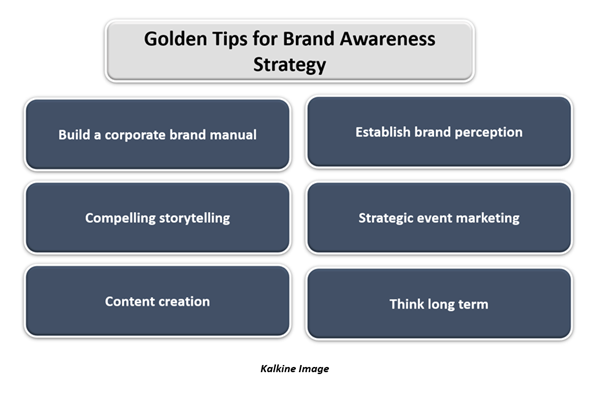What is Brand Awareness?
Brand awareness is the concept where the company is able to create a unique positioning and client association of its business, such that the customers can recognise a brand under varied circumstances. Awareness is not necessarily about the brand name recall but can also be about the features of the brand.
Brand, one of the organisation’s most valuable assets, is defined as a unique face of the company in terms of its tagline, logo, website, trademark or some slogan. This strengthens the company’s Business to Consumer (B2C) association and brand loyalty.

Brand awareness is created by understanding consumer behaviour, advertising mechanisms and brand management exercises. It is consumers' recall of the brand and its ability not just to recognise the brand image but also associate with products or services, ultimately leading to the purchase decision.
What are the Aspects of Brand Awareness?
Brand awareness consists of two aspects: brand recall and brand recognition. These two aspects are fundamentally different as the brand recall is linked to memory retrieval, whereas brand recognition is associated with object recognition.
Both play a vital role in consumers' decision-making processes as the consumers consider only a few specific brands which are set in their mind. It is believed that the consumers hold about three to seven brands but typically purchase one of the top three brands from its set of brand list.
Several studies have shown that consumers buy familiar, well-established brands. With the vast amount of product options that exist in the market, the company’s brand awareness plays a crucial role to distinguish it from the others.
What is the Significance of Brand Awareness?
It is a winning mantra for the brand - To Convert More Customers, Focus On Brand Awareness.

Kalkine Image
For brands to steer consumers towards the purchase of product or services, brand awareness plays a vital role. Yet with many options available for marketers, it is possible to fail to connect with the consumers. Today's consumers use more than one path before making a purchase decision; hence if the growing conversion rate is the goal, then brand awareness is the route.
With generating a steady customer base, brand awareness can also help convert those substantial amounts of customers into brand ambassadors who then further widen the brand name through word of mouth. This snowball effect can grow the audience exponentially.
Therefore, companies need to draw the aim to decide how they want the audience to perceive the brand before establishing awareness measures.
What are the Metrics to Measure Brand Awareness?
Current market is highly globalised for a brand and awareness plays a key role to put forward performance in the competitive market scenario. Marketers have developed a number of metrics to measure brand awareness and these measures are constantly evolving.
These metrics are famously known as Awareness, Attitudes and Usage (AAU). From product launch to market decline, a product's entire life cycle is managed measuring the brand awareness metrics to ensure product or brand’s market success. Marketers regularly monitor brand awareness levels and if they fall below the pre-set benchmark, the advertising and other promotional activities are intensified to get the awareness to desired levels.
Awareness: Whether you are promoting the business online or you want to position your brand to stand out from the crowd, whatever the goal, uniqueness is the key in order to influence consumers and expand their awareness. Comprehensive market research is conducted by doing effective market analysis to understand target audience, demographics etc
Attitudes: Brand-related advertising increases the awareness. While brand exposure to the consumer increases the brand awareness, repeated brand publicity increases the recognition and recall. But It doesn't end at creating the awareness, marketers have to go one step further to influence consumer attitude towards the brand.
Traditionally through advertising campaigns and print media, brands reached more people with multiple messages. To achieve steady sale and stable market share currently, marketers aim at impacting customers’ attitude towards the brand through advanced social media platforms, event sponsorship and different promotional partners.
Usage: Now with the emergence of digital media, marketers have shifted their strategies and balancing with the traditional as well as digital platforms for advertising. Apart from advertising, organic content creation, involvement in social activities, government affiliations, cross promotions are also few ways to create indirect brand awareness.
Are there any golden tips for strong brand awareness strategy?
Remember Google+, the social media platform which tech giant launched in 2011 to compete with Facebook. Google was not able to scale its product growth, and finally, after running out of capital, they had to shut it down.
Marketers believe that eight out of ten launches fail. No matter how compelling your brand awareness campaign is, if your product/ services do not meet the predetermined standards, the campaign may not have the desired impact on the consumers’ psychology. To ensure this doesn't happen to your brand, create a strong brand awareness strategy but don't forget to see through it.

- Build a corporate brand manual - Be it the logo or the brand name or the layout of your letterhead, have a structure in place to avoid inconsistency. Consistency of your brand esthetics is essential to create brand recall and recognition. Memorability of the brand comes with the consistency in branding.
- Compelling storytelling - All direct or indirect interactions with clients, investors, media or consumers are an opportunity to make a positive impact. More than a product feature, the stories around it are quite memorable. A compelling story will catch the target audience's attention, ultimately resulting in brand recall. Like Apple stores launching at unique places and designs, such as its Washington D.C store at Apple Carnegie Library or Chicago store at the Chicago Riverfront, each store represents a different story.
- Content creation - Nowadays, creating content is more accessible than before, as today's consumers turn to the internet for any questions, concerns. Thus, having a generous amount of relevant content with the spice of journalism will bring the consumer attention to your brand. It doesn't have to be only in written format but can also be about videos, infographics, podcasts, blogs. It's an easy way to position your brand as you want and connect with the audience directly. This is one of the significant components to personify and humanise your brand, and boost organic sales.
- Establish brand perception - This will separate the brand apart from the competitors and represent the brand the way you want it to be served. A less confusing, direct message about the brand overall or the products/ services will let the customers better understand what the brand does and the associated business ethics.
- Strategic event marketing - Sponsoring an exhibition, a conference or even a music concert, whatever expands the reach towards your target audience is to be done. Can't find an event to sponsor or participate, better host your own. It does not just create awareness through media publicity but also a great way for networking with clients or investors.
- Think long term - investment in both brand awareness strategies and lead generation mechanisms goes hand in hand. Brands need to create awareness for customers to make a purchase decision, and with lead generation tactics, the brand will reach the exact target audience. Staying on the path with the appropriate strategies to achieve the ultimate goal can lead to significant gains in your company's brand awareness and eventually increasing customer' client base.
What are some mistakes to be avoided during brand awareness?
Creating brand awareness isn't rocket science but a mix and match of strategies and tactics that work best for your business is needed; the same may not work for others. Many times, marketers are too focused on the tactics but lose sight of strategy. Like they would want to build a website but will not be able to draw the purpose for it.
Hence rather than concentrating more on 'what' you want, focus on 'why' you want, it will lead you to the goal. Failing to set up a goal is another reason brand awareness strategy does not work.
Very often, marketers would choose marketing collateral because they like it but not consider if the target audience will like it or not. Customer is the king and will never be forgotten.
Understand the target audience and narrow it down. Not having a clear idea of whom your product or services campaign should target, will not yield any desirable results. Know your audience and create impactful, targeted marketing.
 Please wait processing your request...
Please wait processing your request...